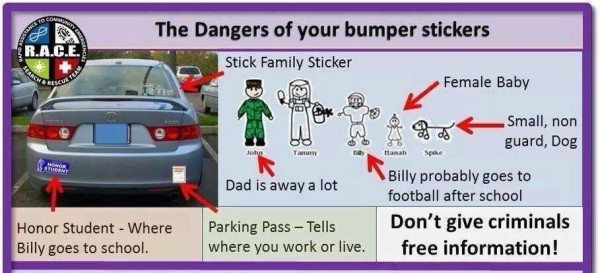I saw this image making the rounds on Facebook. It is from the Kenosha Police Department in Ohio, and illustrates just how much information you may be giving away to criminals just with the cute stickers on your car.
The risks of this behavior are not limited to your car, though. Many people buy signs to support their children’s activities. With a quick trip around the block, you might be able to learn that a boy named Alex plays football for the local middle school, and a girl named Amelia is a high school cheerleader. You would also be able to determine their exact home addresses–based on where the signs are posted, and perhaps discover other relevant information like the makes and models of the cars the parents drive. It all adds up.
Now, think about your social network. Letting the public know that you’re excited that the Houston Astros won a game, or disappointed that the Detroit Red Wings were eliminated from the Stanley Cup Playoffs provide clues as to your favorite sports and teams–common questions used for secondary authentication. If you check-in from a favorite restaurant, or share your anticipation of an upcoming vacation, you are giving the bad guys valuable information.
Think twice about who your audience is, and exercise caution when sharing details–even details that seem harmless to you–with the general public.
- Zero Trust, Real Talk: A Conversation with Dr. Chase Cunningham - January 21, 2026
- Algorithms, Thought Leadership, and the Future of Digital Influence - December 31, 2025
- The Accessories You Need for Your New Gadgets After the Holidays - December 29, 2025



